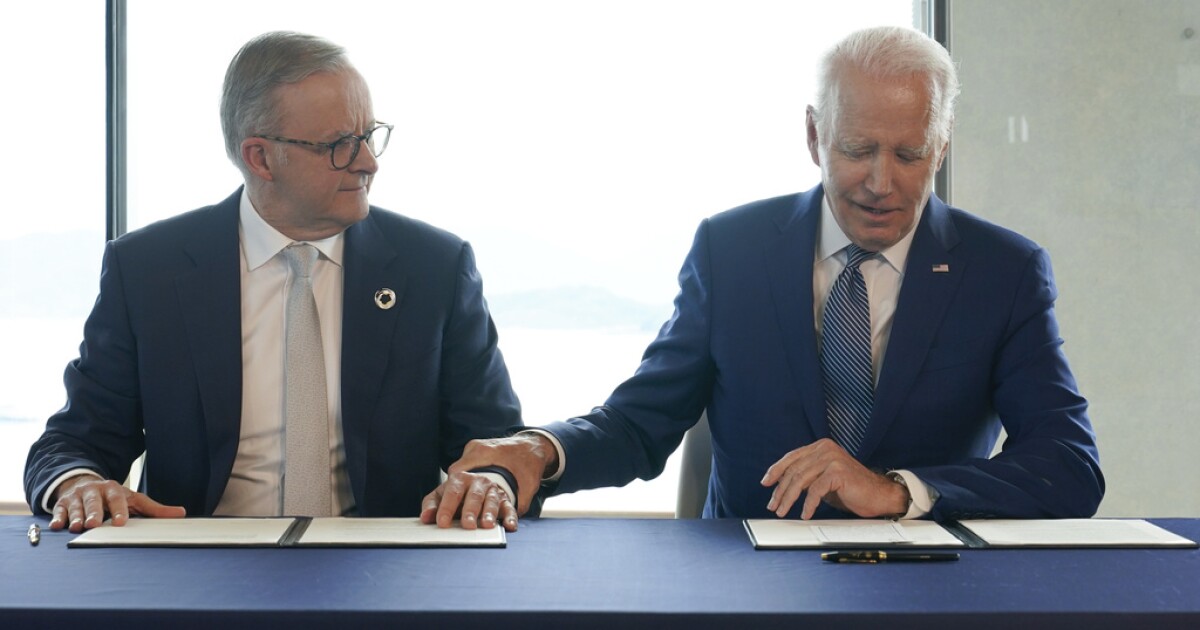

President Joe Biden’s landmark security deal with Australia and the United Kingdom, dubbed AUKUS, is being “strangled” by red tape, according to a senior Australian official.
“Senior intent is not enough unless it is driven through the systems that deliver on that senior intent,” Australian Chief Defense Scientist Tanya Monro said Wednesday. “It is a cultural matter.”
DESANTIS AIMS FOR $2 GAS IN NEW ENERGY VIDEO
The AUKUS pact had been hailed by Biden as a means to broaden “a partnership where our technology, our scientists, our industry, our defense forces are all working together.”
According to Monro, however, U.S. bureaucrats are giving their allies the “NOFORN” (Not Releasable to Foreign Nationals) treatment across an array of technology fronts.
“I’ve had up close and personal experience where leaders responsible for certain areas of technology have given direction that, you know, certain fields of endeavor not to be NOFORN — that Australia, for example, is to be brought in because we have something to offer that will help accelerate what the U.S. is doing,” she told the Center for New American Security, a Washington, D.C.-based think tank. “And yet, it still gets strangled and frozen.”
The sharing of U.S. and British nuclear submarine technology, one of the crown jewels of the trans-Atlantic defense relationship, is the most dramatic exchange in the trilateral security partnership. And yet it is just “pillar one” of the pact, many officials and analysts have emphasized, standing alongside a second pillar that could buttress a broad program to ensure that the United States and its allies have the technological advantage over China.
“If Pillar One was historic, then Pillar Two promises to be revolutionary,” a Center for Strategic and International Studies analysis claimed because it harnesses the research and industrial capacities of all three allies in several cutting-edge technology arenas. “Individually, each area of Pillar Two has game-winning potential in the strategic competition with China. Taken together, they could be game-changing, securing the future military and economic advantage of the AUKUS nations and recasting the nature of this competition for global influence.”
Those partnerships, Monro hopes, will produce the kind of “disruptive technology” that will be even more significant than the nuclear submarines.
“It’ll [mean] having, you know, uncrewed submarines that can lurk and threaten to deliver effects. … It’ll be having ways of making an adversary question their own decisions,” the Australian defense scientist said. “All of these things are slightly more amorphous and less tangible than a shiny submarine. And by its very nature, we have to be very deliberate about what we conceal and what we reveal. And I think AUKUS gives us a really powerful new way to do that, not as nations but together.”
CLICK HERE TO READ MORE FROM THE WASHINGTON EXAMINER
At least, it has provided for that kind of cooperation in theory, but Congress still needs to overhaul the International Traffic in Arms Regulations to fortify the legal authority for the technology-sharing to take place. And even then, leaders will have to overcome the bureaucratic anxieties that have paralyzed even clearly-authorized cooperation.
“[There are] very rational human fears of people within the system, that they will be personally liable and accountable for those decisions that go against the culture and precedent of keeping other nations out,” Monro said. “What I would urge is a really mature conversation about the advantage to the U.S. … the advantage to the U.S. in having a more broad base of innovation, science, and technology; the advantage to the U.S. in having more resilience in supply chains and sustainment opportunities.”





